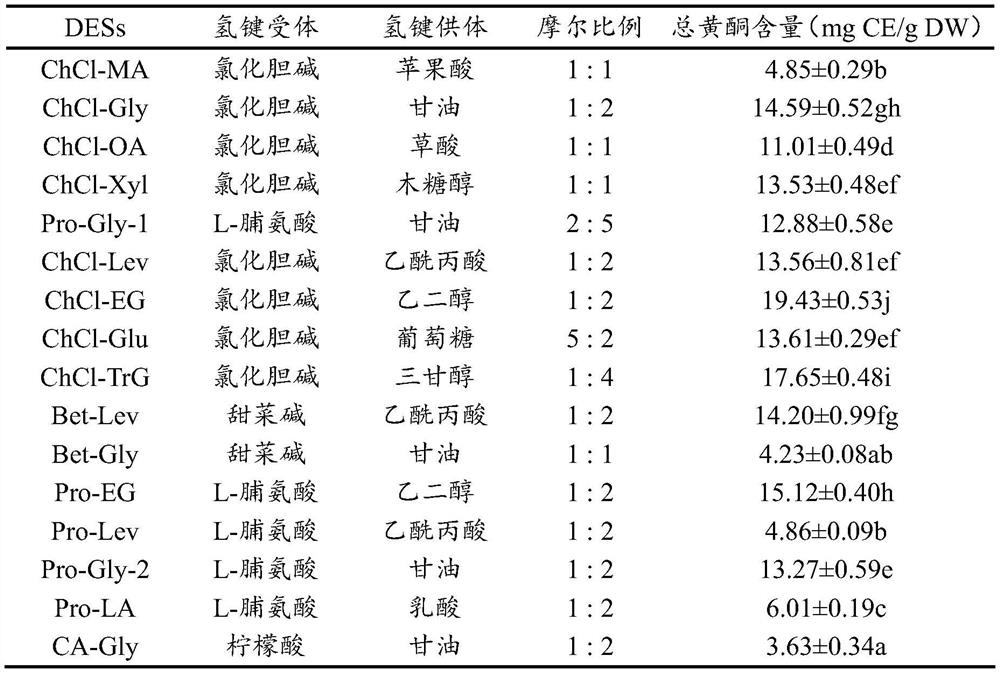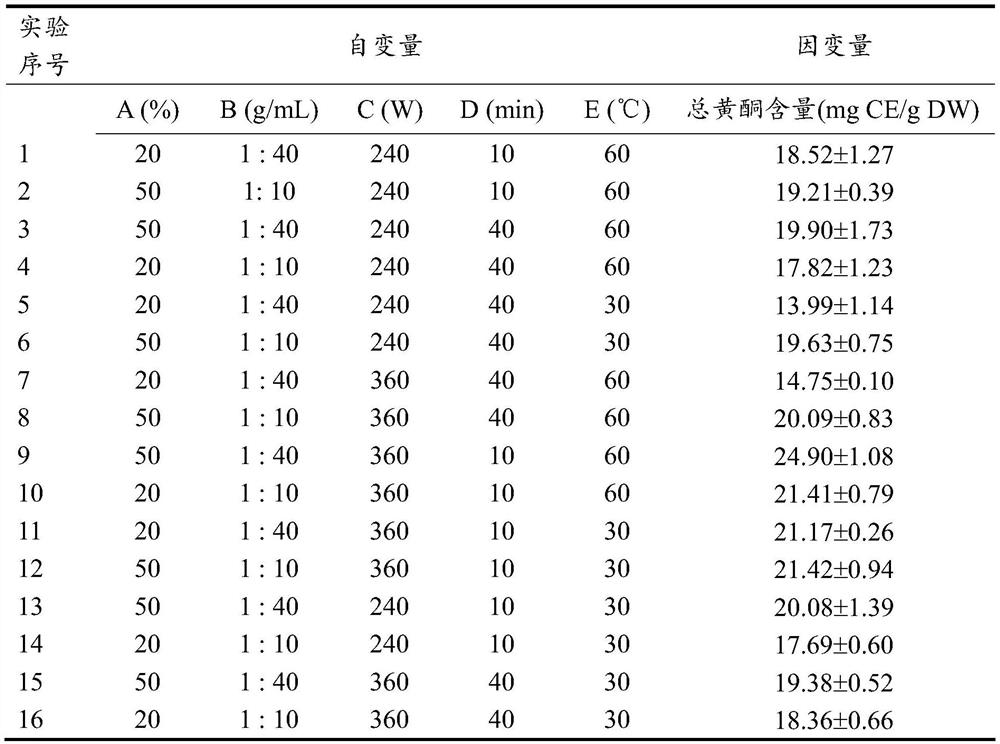Extraction method of phenolic substances of Chinese fevervine herb and root as well as application of extraction method
An extraction method, the technology of chrysanthemum chrysogenol, which is applied in the field of chrysanthemum extraction, can solve the problems of flammability, low substance content, and low extraction efficiency, and achieve the effect of accurate detection and high antioxidant activity
- Summary
- Abstract
- Description
- Claims
- Application Information
AI Technical Summary
Problems solved by technology
Method used
Image
Examples
no. 1 example
[0026] A method for extracting gallinaceous phenols, comprising the steps of:
[0027] (1) Preparation of deep eutectic solution: Mix different hydrogen bond acceptors and hydrogen bond donors in proportion, heat them in a water bath at 80°C and keep stirring until a uniform transparent liquid with a certain viscosity is formed, and cool to room temperature ( About 25 ℃), add water and mix well, obtain the depth eutectic solution (DESs) of different components that water content is 40% (mass concentration), specifically as shown in table 1.
[0028] (2) Mix 0.5g of Caulis chinensis powder with 5mL of DESs prepared in step (1), extract the resulting mixture at 40°C with 320W ultrasonic power for 30min, and then extract the obtained crude extract in a centrifuge at 13000rpm Centrifuge at a high speed for 10 minutes, and take the supernatant to obtain the extract of P. chinensis.
[0029] (3) Determination of the total flavonoids content in the extract of Caulis chinensis by alu...
no. 2 example
[0035] Using ChCl-EG in the first embodiment as the deep eutectic solvent (that is, choline chloride and ethylene glycol with a molar ratio of 1:2), it is prepared into a deep eutectic solvent with a water content of 40% (mass concentration). solution, and then adopt the method of step (2) to obtain the extract of Caulis chinensis.
[0036] Further, in step (2), the adopting 2 that is generated by Minitab 17 software K The design matrix constructed by the factorial experimental design comprehensively investigated 5 factors, including the water content of DES (A), the mass-to-volume ratio (B) of the deep eutectic solution and the cassava powder, the ultrasonic power (C), and the ultrasonic time ( D), the effect of ultrasonic temperature (E) and its interaction on the total flavonoid content of the extract of Caulis chinensis. Taking the total flavonoids content as the dependent variable, the key factors that have a significant impact on the total flavonoids content of C. chine...
no. 3 example
[0041] The deep eutectic solution that 0.5g of turmeric powder is mixed with DES (choline chloride and ethylene glycol with a molar ratio of 1:2, ChCl-EG) that has the best extraction effect in the first embodiment of 10mL, Under optimal ultrasonic conditions (the water content in DES is 49.2%, the ultrasonic power is 300.6W, the ultrasonic time is 9.7 min, and the ultrasonic temperature is 40°C), adopt the method of step (2) of the first embodiment to obtain the extract of Caulis chinensis, record for DES-UAE.
[0042] The content of total flavonoids in the extract of P. chinensis was determined by the aluminum nitrate-sodium nitrite colorimetric method, and the phenolic substances were further identified and quantified by ultra-high performance liquid chromatography-Xevo triple quadrupole mass spectrometry. The conditions are as follows: Acquity UHPL CBEH-C18 chromatographic column (2.1 i.d.×100mm, 1.7 μm, Waters, USA), with 0.25% acetic acid aqueous solution (A) and 0.25% a...
PUM
 Login to View More
Login to View More Abstract
Description
Claims
Application Information
 Login to View More
Login to View More - R&D
- Intellectual Property
- Life Sciences
- Materials
- Tech Scout
- Unparalleled Data Quality
- Higher Quality Content
- 60% Fewer Hallucinations
Browse by: Latest US Patents, China's latest patents, Technical Efficacy Thesaurus, Application Domain, Technology Topic, Popular Technical Reports.
© 2025 PatSnap. All rights reserved.Legal|Privacy policy|Modern Slavery Act Transparency Statement|Sitemap|About US| Contact US: help@patsnap.com



